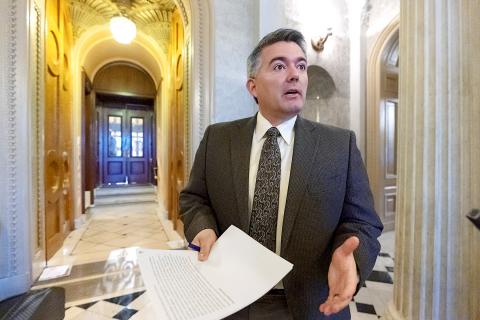US Senator Cory Gardner on Wednesday said that Chinese President Xi Jinping’s (習近平) speech about Taiwan changes the “status quo” across the Taiwan Strait and is a warning to the US.
When asked by Taiwanese media about the address Xi gave on Wednesday last week, Gardner, chairman of the US Senate Foreign Relations Subcommittee on East Asia, the Pacific and International Cybersecurity Policy, said the US should adhere to its commitment to Taiwan.
The US’ Asia Reassurance Initiative Act contains significant language dedicated to the US’ relationship with Taiwan, including provisions to ensure arms sales and facilitate high-level visits to Taiwan from the US, he said.

Photo: AP
“We will continue to pursue those commitments and protections... Our commitment to our relationship with Taiwan is stronger than ever,” Gardner said,
Asked whether he would encourage President Tsai Ing-wen (蔡英文) to visit Washington, Gardner only said that he had met with Tsai when she made a transit stop in Los Angeles last year, and that he hopes similar arrangements could be made in the future.
Gardner had tweeted about Xi’s recent Taiwan policy speech and Tsai’s response, saying that he would soon resubmit the Taiwan Allies International Protection and Enhancement Initiative Act to the US Congress.
It authorizes the US Department of State to downgrade US relations with any government that takes adverse action regarding Taiwan, including suspending or altering foreign assistance, such as military funding.
Xi’s speech on Taiwan marked the 40th anniversary of a message Beijing sent to Taiwan in 1979 calling for unification and an end to military confrontation.
In the speech, Xi defined the so-called “1992 consensus” as “the two sides of the strait belonging to one China and working together to seek the unification of the nation.”
The “one country, two systems” formula is the best approach to achieving unification, he said.
Tsai afterward said that she has never and would never accepted the “1992 consensus,” as the phrase has been defined by China as “one country, two systems,” which leaves no room for interpretation.
The “1992 consensus” — a term former Mainland Affairs Council chairman Su Chi (蘇起) admitted making up in 2000 — refers to a tacit understanding between the Chinese Nationalist Party (KMT) and the Chinese Communist Party that both sides acknowledge there is “one China,” with each side having its own interpretation of what “China” means.

Taipei has once again made it to the top 100 in Oxford Economics’ Global Cities Index 2025 report, moving up five places from last year to 60. The annual index, which was published last month, evaluated 1,000 of the most populated metropolises based on five indices — economics, human capital, quality of life, environment and governance. New York maintained its top spot this year, placing first in the economics index thanks to the strength of its vibrant financial industry and economic stability. Taipei ranked 263rd in economics, 44th in human capital, 15th in quality of life, 284th for environment and 75th in governance,

Greenpeace yesterday said that it is to appeal a decision last month by the Taipei High Administrative Court to dismiss its 2021 lawsuit against the Ministry of Economic Affairs over “loose” regulations governing major corporate electricity consumers. The climate-related lawsuit — the first of its kind in Taiwan — sought to require the government to enforce higher green energy thresholds on major corporations to reduce emissions in light of climate change and an uptick in extreme weather. The suit, filed by Greenpeace East Asia, the Environmental Jurists Association and four individual plaintiffs, was dismissed on May 8 following four years of litigation. The

A former officer in China’s People’s Liberation Army (PLA) who witnessed the aftermath of the 1989 Tiananmen Square massacre has warned that Taiwan could face a similar fate if China attempts to unify the country by force. Li Xiaoming (李曉明), who was deployed to Beijing as a junior officer during the crackdown, said Taiwanese people should study the massacre carefully, because it offers a glimpse of what Beijing is willing to do to suppress dissent. “What happened in Tiananmen Square could happen in Taiwan too,” Li told CNA in a May 22 interview, ahead of the massacre’s 36th anniversary. “If Taiwanese students or

The New Taipei City Government would assist relatives of those killed or injured in last month’s car-ramming incident in Sansia District (三峽) to secure compensation, Mayor Hou You-yi (侯友宜) said yesterday, two days after the driver died in a hospital. “The city government will do its best to help the relatives of the car crash incident seek compensation,” Hou said. The mayor also said that the city’s Legal Affairs, Education and Social Welfare departments have established a joint mechanism to “provide coordinated assistance” to victims and their families. Three people were killed and 12 injured when a car plowed into schoolchildren and their